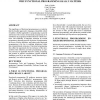Free Online Productivity Tools
i2Speak
i2Symbol
i2OCR
iTex2Img
iWeb2Print
iWeb2Shot
i2Type
iPdf2Split
iPdf2Merge
i2Bopomofo
i2Arabic
i2Style
i2Image
i2PDF
iLatex2Rtf
Sci2ools
113
click to vote
APPINF
2003
2003
Why Functional Programming Really Matters
The significance of functional programming is revealed as that the feasible approach to language extensibility which it enables is further applicable to programming in general and beyond. The essence of functional programming is its enablement of programmer-defined function-valued functions. The feasibility of language extension by normal programmers depends upon the exclusion of interpretation in favour of direct definition, and higher-order functional programming is the key to enabling definitional rather than interpretational extensions. Functional programming thus offers the opportunity for the exclusion of the interpretation that otherwise pervades programming in general, and may be applicable beyond to analog computing and systems in general. Nevertheless, specific technical challenges need to be met before “totally functional programming” can realise its promises. KEY WORDS Programming Tools and Languages; Functional Programming; Language Extensibility; Software Design and ...
APPINF 2003 | Functional Programming | Information Technology | KEY WORDS Programming | Language Extensibility |
Related Content
| Added | 31 Oct 2010 |
| Updated | 31 Oct 2010 |
| Type | Conference |
| Year | 2003 |
| Where | APPINF |
| Authors | Paul A. Bailes, Colin J. M. Kemp, Ian Peake, Sean Seefried |
Comments (0)

